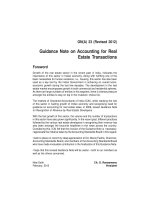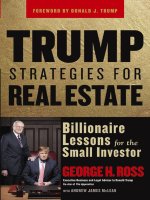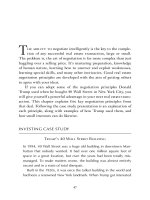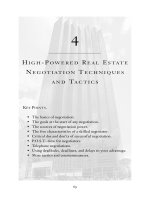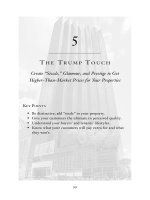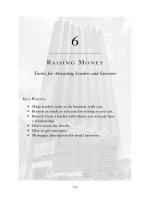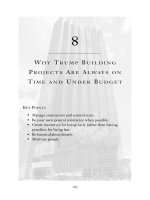TRUMP STRATEGIES FOR REAL ESTATE CHAPTER 4 ppsx
Bạn đang xem bản rút gọn của tài liệu. Xem và tải ngay bản đầy đủ của tài liệu tại đây (604.88 KB, 29 trang )
69
4
H
IGH
-P
OWERED
R
EAL
E
STATE
N
EGOTIATION
T
ECHNIQUES
AND
T
ACTICS
K
EY
P
OINTS
.
•The basics of negotiation.
•The goals at the start of any negotiation.
•The sources of negotiation power.
•The five characteristics of a skilled negotiator.
•Critical dos and don’ts of successful negotiation.
•P.O.S.T time for negotiators.
•Telephone negotiations.
•Using deadlocks, deadlines, and delays to your advantage.
•More tactics and countermeasures.
71
I
HAVE BEEN NEGOTIATING
real estate transactions for giants in
the industry for 50 years. But when I was a young lawyer I knew
very little about negotiation and as a result, I am sure I unwittingly
left a lot of my client’s chips on the table. Early on, I recognized my
own shortcomings and decided to make an intensive study of the
field of negotiation. I researched the tricks of the trade from books
and from the more experienced lawyers or negotiators who were
often my adversaries. When they did something that was effective, I
made it part of my style.
Then, after 20 years of experience in real estate negotiations, I
started working with Donald Trump, a negotiating genius from
whom I learned even more. This chapter is a compilation of tech-
niques I’ve learned from negotiating over a thousand real estate
deals, coupled with Trump’s extremely successful variations on the
art of negotiating. We have both learned a lot from our association
and if you follow the concepts set forth in this chapter and Chapter
3, you will learn much of what I wish I had known when I was a
young attorney.
By the way, almost all of the techniques that are discussed in this
chapter and the negotiating principles found in Chapter 3 are appli-
cable to the case studies on Trump investments that appear through-
out this book. Once you have digested the meat of Chapters 3 and 4,
it will be easy for you to spot how Trump and I used these principles
and techniques in the investing case studies.
The real estate community is a tough breed to negotiate with.
Because each parcel of real estate is unique—its location, views, and
topography are but a few of its characteristics. Therefore, each real
TRUMP STRATEGIES FOR REAL ESTATE
72
estate negotiation is also unique. Developers and landlords are often
big risk takers and typically shrewd negotiators, whether dealing in
small properties or in multimillion dollar properties. But if you fol-
low the guidelines set forth in this chapter you will be able to swim
with the “sharks” without becoming their lunch.
T
HE
B
ASICS OF
N
EGOTIATION
Although each of us has been negotiating our entire lives, we know
little about it and just do what comes naturally. That’s a huge mis-
take! Negotiation is such an important part of life I am constantly
amazed at how little time people spend developing a good technique.
One of my main purposes in writing this book is to help you improve
your understanding of negotiation and develop the skills necessary to
achieve success.
What Is Negotiation?
In my negotiation seminars at New York University, I ask my stu-
dents every year: What is negotiation? The three best answers I’ve
heard are these:
1. It is one aspect of life where there are no governing rules.
Lying is not only permitted, it is an accepted practice.
2. It is accepting an available compromise as a substitute for that
which you really thought you wanted.
3. It is a journey to an imaginary destination without a road
map where all the signposts and directions are intentionally
misleading.
H
IGH
-P
OWERED
R
EAL
E
STATE
T
ECHNIQUES
73
Now let me tell you what negotiation is not:
•It is not a science (all the key concepts are abstract).
•It is not a problem which has a right or wrong answer.
•It is not a situation in which winning is everything.
•It is not an event with continuity.
T
HE
G
OALS AT THE
S
TART OF
A
NY
N
EGOTIATION
The ultimate goal of a negotiation, especially a real estate negotia-
tion is to profit from it. But there are several forms of profit. Of
course, the first one is monetary, such as a better price or interest
rate. But there can be other valuable outcomes to a negotiation, such
as acquiring knowledge about a property. More subtly, often the par-
ties in a transaction also have the unconscious goal of obtaining sat-
isfaction from a negotiation and feeling good about the outcome, or
at least not losing face. This is another form of “profit” that you want
your opponent to feel they have earned.
However, at the beginning of a negotiation, real estate in-
vestors (or anyone in a negotiation) should focus on the following
immediategoals:
• Learn the other side’s position. If we learn what the other parties
want we can attempt to structure a transaction that meets their
needs. There is always a reason or reasons why the other side is
willing to consider doing a deal. If you “find the story” of what
they really want and think is important, you can address their
concerns.
•
Understand the constraints surrounding the transaction. Every
transaction has some controlling factors such as a time frame,
competing offers, tax implications, or required approvals. If you
learn what they are you can use them to your advantage.
TRUMP STRATEGIES FOR REAL ESTATE
74
• Define “fair and reasonable.” What these words mean to each ne-
gotiating party may be very different. Understanding that there
is a difference in what each side considers “fair and reasonable”
is necessary before you can start to reduce the gap in percep-
tion between the two sides.
• Assess “your side.” The personality, knowledge, and skills of the
people on your team are equally important to know.
•
Assess the “other side.” It is essential to know the personalities,
knowledge, and desires of your opponents. Are they sophisti-
cated, or abrasive, or people you can be comfortable negotiat-
ing with? If you think they are untrustworthy, you should run
for the nearest exit! One thing that should be perfectly clear in
negotiating: There is no way you can ever protect yourself
against a thief. No legal document can protect you. Nothing
can. If you get involved with someone who is a thief, you’re in
big trouble.
Do You Really Want to Do Business with These People?
After you’ve researched and digested all the available information
about the parties you’re dealing with in a real estate transaction, it’s
time to trust your instincts. Everyone develops instinctive reactions
as a result of prior learning experiences, and when your instincts
prove right in a situation, you gradually begin to learn to trust them
in the future. When an instinct proves wrong, you quickly learn to
abandon it. The result of this sorting process is the creation of a set
of instincts that your experience tells you can be trusted.
Yo ur instincts are usually pretty close to being right, especially
once you have developed a style of negotiation you are comfortable
with. If the deal doesn’t feel right; if you instinctively feel like you’re
dealing with someone who’s shady, don’t deal with them. You may
never be able to prove it, but it is your instinct that has triggered a
H
IGH
-P
OWERED
R
EAL
E
STATE
T
ECHNIQUES
75
response. And usually your instincts are right because you have de-
veloped them over a long period of time. If you think the deal is too
good to be true, it probably is. Or, if you think the person you’re get-
ting involved with is someone who seems to remind you of the snake
oil salesman in old movies and is prone to exaggerate, or you can’t
trust what they say, then don’t get involved with them.
Here’s an example I often use that confirms the value of instinct.
Yo u’re walking down the sidewalk and farther down you see a group
of men. They appear to be a gang of rowdy teenage boys. Instinc-
tively you sense trouble, they’re doing something that you sense
could become a problem or be a source of danger. So, instinctively
you cross the street and begin walking on the other side. And you do
this because of something that has happened in your past that tells
you instinctively what to do.
Also, if someone comes across as a straight shooter but you feel
they’re just too good to be true—you shouldn’t do business with
them. Rely on your gut feeling. I’m not saying you shouldn’t trust
people, but investigation is a necessity. I will take at face value any-
thing thatissaid by somebody whom I think I can completely trust,
but I’ll check everything out later. In fact, I always start out with a
lot of assumptions about a real estatedealorpeople involved in a deal,
but I assume that every assumption is wrong. Then I’m surprised
when an assumption proves right. I always assume that I am dealing
withatrustworthy individual. But I investigate and do a background
check to verify the validity of my assumption. Then I’ll be satisfied
that my assumption was right.
However, I may end up with a situation where I checked this
person out and he seemed trustworthy, but along the way he does
something that changes my opinion. What should you do when
you’re dealing with partners you feel you can’t trust? Get out!
That trust can never be reinstated. Never! Your partner says he’ll
never do it again, but once the trust has been breached, it can never
TRUMP STRATEGIES FOR REAL ESTATE
76
be corrected. It’s like the husband who cheats on his wife, and
he says “Honey, I’ll never do it again.” The wife is crazy if she be-
lieves him!
S
OURCES OF
N
EGOTIATING
P
OWER
Negotiating power is the ability and resources to influence others.
Some subtle forms of negotiating power include:
•
Good record keeping. Having good records favors the party who
has them when there is a disagreement about what or when
something was said. He who has better records and better notes
wins the argument about what was said when, and who promised
to do what.
• Preprinted forms. These favor the party supplying them. For ex-
ample, if a contract is titled “Standard Purchase Agreement”
people assume it’s nonnegotiable.
• Company policy. The mere statement: “That’s our company pol-
icy” usually puts an end to many disputes.
• Knowledge. Revealing that you have a lot of knowledge or infor-
mation about a transaction can intimidate the other side so
they will ask for fewer concessions. Often people think: “He’s
too smart for me to try to get this concession.”
• The willingness to take risks. AssumeIhavetossedacoin50times
andeachtimeitcameupheads. So I say to you: “I’ll give you 10
to1odds that it will come up heads again.” Now there’s a bet
you would be inclined to take since you know the real odds are
50–50. Assume that your entire fortune at that time is $100,000
andIsay:“It’s my million against your $100,000, okay?” Some-
how you start thinking: “With my fortune on the line, it’ll
H
IGH
-P
OWERED
R
EAL
E
STATE
T
ECHNIQUES
77
probably come up heads again, andI’llloseeverything.”Your
willingness to take ariskhas entered the negotiating arena and
colored your decision.
• Time. Time is the ultimate negotiating power. Every real estate
transaction has a time frame within which the parties must
work if they want to make a deal. He who controls the timing
controls the deal.
F
IVE
C
HARACTERISTICS OF A
S
KILLED
N
EGOTIATOR
A renowned researcher in the field of negotiation conducted a survey
in which CEOs of major corporations were asked to rate, in order of
importance, the requisite qualities of people they would utilize to ne-
gotiate on their behalf. Even though I had developed my own ideas,
their choices surprised me. Here they are:
1. Personality. They believed that a good personality was more
important than knowledge. (That shocked me.)
2. Knowledge of the subject matter. Ithought that would have been #1!
3. Ability to organize information. This speaks volumes for the im-
portance CEOs placed on good work habits such as record-
keeping and efficient filing and retrieval systems.
4. Knowledge of human nature. Wouldn’t you think this would have
a higher ranking?
5. Ability to find and exploit weaknesses. CEOs were interested in
utilizing people who had the brainpower and mental agility to
probe the other side without setting off any warning bells, and
then use the information gained to their advantage.
The next section of this chapter describes how you can develop
these five negotiation skills that CEOs value most highly.
TRUMP STRATEGIES FOR REAL ESTATE
78
Improve Your Personality
Be a “nice person” to deal with. Be friendly. Make others feel “com-
fortable” in talking and dealing with you. This is essential. If people
like you they’ll go all out to please you. Look for common ground to
establish a good rapport with the other side. Find a common theme
for discussion. Look around their offices or desks. If they’re inter-
ested in sports—talk sports. Look for family pictures and ask ques-
tions about them. “Is that your grandchild? She looks like a tomboy,
is she? How many grandchildren do you have? How many boys? Do
you see them often?” The greater interest you show in them, the
more you engender a “warm and cozy” feeling.
Exhibiting a good sense of humor is usually an excellent ice-
breaker, but stay clear of anything that might be considered offensive.
Let it be known that you are a deal maker, not a deal breaker. Con-
vince the other side of your sincerity and desire to reach a mutually
amicable conclusion.
Learn flexibility. In negotiation, you rarely get exactly what you
want. Getting close or achieving an acceptable alternate is equivalent
to total victory.
Establish a reputation of trustworthiness. If you promise to call,
do so. If you say, “I’ll get you that information,” get it. Remember
there is a severe discount factor for lack of trust. You can never quan-
tify the amount of the discount. No one ever asks for a pound of
friendship or a bucket of integrity but they are always willing to pay
(in the form of granting concessions) if you deliver friendship and
integrity in the negotiation process.
Display Knowledge of the Subject Matter
An interesting phenomenon I mentioned earlier in this chapter is
that if you convince your adversaries that you have extensive knowl-
edge—even though you really don’t, you may win many points when
H
IGH
-P
OWERED
R
EAL
E
STATE
T
ECHNIQUES
79
your adversaries overestimate how savvy you really are. They may
abandon a negotiation strategy thinking: “He’s too smart for that to
work.” The kind of knowledge you want to display to your adversary
in a negotiation falls into two categories:
1. Actual knowledge. This is the knowledge obtained by one’s own
private experiences and education. You can easily increase
your store of knowledge by talking to outside professionals
prior to and during negotiations. Never be afraid or shy to ask
questions from someone in the know. The only stupid ques-
tion is the one you didn’t ask! Having discussions with experts
or people on your side is essential to obtaining the information
you need to shape your approach to any upcoming negotiation.
2. Apparent knowledge. This is the broad, or even superficial infor-
mation that a negotiator exhibits when discussing a particular
subject. When coupled with a smooth authoritative delivery it
can prove very effective. It may involve knowledge that the ne-
gotiator gained from comparable negotiations with comparable
adversaries in comparable situations. For example, if you’re
dealing with a loan officer from a new bank and you’ve dealt
with loan officers from other banks, you can assume that the
same corporate procedures and mentality will be found. Dis-
playing your knowledge of loan procedures to the new loan of-
ficer will make the officer less likely to pad the bank’s fee, and
more likely to make the adjustments you ask for.
Organize Your Information: Donald Trump’s Spiral
Notebook and Other Tools
If you want to develop this highly desirable characteristic it is essen-
tial that you develop a work habit and an infallible method of filing
information for immediate retrieval. You will find this a lifesaver
TRUMP STRATEGIES FOR REAL ESTATE
80
when you’re under stress. I suggest you use a simple spiral notebook,
not a loose leaf one where pages are removable. If you look at Donald
Tr ump’s desk you will see his spiral notebook in which he chronicles
all his telephone calls and things to do. If it’s an important work
habit for him, why not for you? Stop writing notes, telephone num-
bers, or other information on the back of envelopes or on those
treacherous little colored tags that stick to anything and tend to dis-
appear when you try to find them.
Another great technique is creating a checklist of open issues,
which is subject to constant revision. As you get more involved in
real estate you will find that one deal looks like many others and it
becomes difficult, if not impossible, to keep the status of negotia-
tions separate. An up-to-date checklist helps immensely.
Another valuable tool is a “we-they list” of the different positions
taken by each of the parties. This will clarify the zone of uncertainty
mentioned earlier. It helps tremendously to write down the key facts
about which you and the other party have fundamentally different
and conflicting perceptions and beliefs. These need to be faced and
attacked to enable the transaction to reach a mutually acceptable
conclusion.
I supplement this “we-they list” with a “wish list” in which I jot
down how I would like to resolve certain issues, or get the other side
to accept a new concept. This is a valuable aid because it forces me to
think of possible solutions and scenarios to make them a reality.
Somewhere in the midst of negotiation, I also recommend you
prepare a scorecard in which you name all of the players, identify their
roles in the transaction, and evaluate their plusses and minuses, to
help
you understand what each person wants, what you can offer them, and
how they could help or hurt your position in the negotiation.
These tips are not meant to be all-inclusive but they constitute a
strong foundation on which your own unique style of organizing in-
formation can be built.
H
IGH
-P
OWERED
R
EAL
E
STATE
T
ECHNIQUES
81
Improve Your Knowledge of Human Nature
Many of the following basic truths may seem obvious and simplistic
to you but I doubt you have spent a substantial amount of time an-
alyzing the impact they have on the outcome of negotiations.
Researchers in the field of negotiation have done extensive, com-
prehensive experiments to prove the validity of these concepts. I
cannot stress too strongly that the time you spend making them
part of your base of knowledge is time well spent. It will be ex-
tremely helpful in your future negotiations.
• Create exclusivity. I mentioned this in Chapter 3 but it’s so im-
portant it warrants repeating: People want what they can’t have
or somebody else wants. If someone announces: “That’s not for
sale at any price” everyone thinks that there must be some price
at which it can be bought. This concept is found at the heart of
all auctions. The more bidders for an item, the higher the bids
and the more spirited the bidders.
• People become overwhelmed when they are faced with too many deci-
sions. Once you accept this fact you can easily understand why it
is best to use a “little at a time” approach. Just imagine that you
want someone to swallow a pill the size of a golf ball. If you
tried to give it to him at one time, he would choke on it. If,
however, you cut the pill up into little pieces and gave it to him
at various intervals, he would swallow the entire pill and never
realize what you made him do.
• The “aura of legitimacy” phenomena. I discussed this extremely im-
portant topic in Chapter 3. If you’re still unclear about its power
to work for you or against you, I suggest you reread that chapter.
• Satisfaction. Everyone in a negotiating situation has a “need for
satisfaction.” People want to believe that they have conducted a
successful negotiation and have won hard fought concessions
TRUMP STRATEGIES FOR REAL ESTATE
82
from you. To satisfy that need you must learn to hold back. Be
stingy with your concessions even though they may be of little
importance to you, the fact that the other side got you to give
in on an item is considered a win for them. Because winning a
hard fought issue, which was the subject of protracted negotia-
tion, creates the feeling of deep self satisfaction in the winner it
is important for you to leave time in the negotiation for this to
happen. Learn to cater to the needs of individuals. Tell them
how they out-negotiated you and drove such a hard bargain.
Te ll them they got an unbelievable price and you don’t know
how they did it. Everyone likes to be flattered. Do it, even if
you feel that you might choke on the words.
• People have an innate fear of superiority in others. While it’s im-
portant to display your knowledge of the subject matter in a ne-
gotiation, you don’t want to appear so smart that people are
afraid to deal with you.
In recognition of this you must sometimes adopt the prin-
ciple that “dumb” is “smart.” Sol Goldman who will be dis-
cussed later was a multimillionaire with a humble background
as a grocery vendor. Notwithstanding his lack of formal educa-
tion, he had one of the sharpest minds I ever encountered. He
was a brilliant negotiator who played a major role in my suc-
cessful growth as a negotiator. He could remember anything
and everything about any piece of real estate or anyone in the
real estate arena. In any negotiation the other parties never had
a clue as to the extent of his proficiency. If someone said some-
thing he needed time to consider, he’d say, “You people are
much smarter than I am. Could you please give me a simpler ex-
planation that my small mind can understand?” He knew full
well what was being proposed as well as what his answer might
be. But, often the simplified explanation was more attackable
than the initial one, and if that was true he would respond to
H
IGH
-P
OWERED
R
EAL
E
STATE
T
ECHNIQUES
83
that one. His delay in responding also gave him the time to
sharpen his response and then deliver it as if he were a local
yokel shooting from the hip without considering the depth of
the subject matter. When Sol Goldman died in 1987, his real
estate holdings were appraised at over $700 million and reputed
to be second in size only to the holdings of New York City. Not
bad for someone who gave the appearance of being dumb.
•
Ziff ’s Principle of Least Effort. As I mentioned in Chapter 1, Ziff
was a researcher who concluded that in any negotiation people
will expend the least amount of effort to arrive at a result. You
can use this principle to your advantage by agreeing to do all the
work that the other side really doesn’t want to do. Tell the other
side that you know how busy they are and you will take a load off
of them by doing much of the menial work. Besides appearing to
be helpful, if you are the party who originates and controls the
documentation and preparation of financial information relating
to any transaction you have a huge edge. You know what you put
in the documentation and what you left out. The reader has a
tendency to be trapped by the written word and concentrates on
what he sees, not what he doesn’t see. Let Ziff’s findings work
for you.
•
Everyone loves a “freebie.” This principle is the cornerstone of
many successful marketing and sales strategies. “Buy one get
one free.” “If you take advantage of this special offer, we’ll
send you another gizmo absolutely free.” “Buy today and we’ll
pay the shipping charges.” The list is endless but it works. Try
to come up with something you are willing to throw into
the deal without charge and that minor inducement might win
the day.
• People believe in the “one good turn theory.” “One hand washes the
other” and “One good turn deserves another” are considered
by most people to be the fair way of doing business. I tend to
TRUMP STRATEGIES FOR REAL ESTATE
84
agree with that bit of philosophy. However, it doesn’t mean
that an equal exchange is required, just that there be a quid
pro quo. There’s nothing that says your “quid” must have the
same value astheir“quo.” Embrace the concept but slant the
exchange in your favor. Others will be so enthralled by your
fairness that they forget to weigh the respective benefits of the
items exchanged.
• Everyone is influenced by the power of a simple solution. Somehow
“Let’s split the difference” seems only fair to most people.
Throw it out as a solution if it’s in your interest to do so, but if
it’s offered to you, don’t accept it if you think it’s not fair to
you. “Let’s discuss this later” is an easy way to avoid locking
horns over an issue where feelings run high.
• People appreciate a person who can say, “I made a mistake.” Suppose
you made an offer to purchase a building for $200,000 and the
offer was accepted. After further consideration, you told the
seller that the cost of needed repairs was much higher than you
thought and you wanted to reduce the purchase price by
$40,000 If the seller accuses you of bad faith and reneging on
your agreement just say, “I’m terribly sorry but I made an hon-
est mistake and you wouldn’t take advantage of that, would
you?” That admission may get you part or all of the $40,000
discount you asked for.
• Most people are stricken by the “deadline syndrome.” Just before
time runs out is the most effective time to win your objective.
When your opponent is facing a deadline such as, “I have to re-
port to my boss by 3
P
.
M
.today” closing open issues happens
quickly after 2:45
P
.
M
.Find out what the other party’s deadline
is, wait until the last minute to resolve key issues, then see the
favorable result you get.
• People want their “invested time” to pay off for them. I discussed
how the “invested time” principle works in Chapter 3. Donald
H
IGH
-P
OWERED
R
EAL
E
STATE
T
ECHNIQUES
85
Tr u mp and I have used it to achieve results that we originally
thought were not attainable.
Finding and Exploiting Weaknesses
Information is power in a negotiation. I have to derive information
from you, and to do that, I have to ask you a lot of questions. If I said
to you, “Are you really in such a bind that you have to move out of
your property in the next few weeks?” You’re never going to tell me
yes, because that’s going to hurt your negotiation posture. So in-
stead, you say “I want to move in by the end of the year.” And I re-
spond by saying, “I don’t know if that’s possible, suppose I gave it to
you three months later?” You reply, “I can’t use it three months later,
I have to use it now.” Without you realizing it, you just told me
you’re in a bind. All I did was throw out an alternative, and you said
that “I couldn’t live with the alternative.” Which effectively got me
the answer to my question.
Another indirect question might be, “What if instead of us paying
all cash, you take back a mortgage for $25,000?” If the reply is, “I re-
ally need the cash to pay off the debt to my bank.” Guess what—
you’ve discovered a weakness that you may be able to capitalize on.
Sometimes a timing question elicits a helpful response. You pose the
following question, “Would you be upset if I extended the lease com-
mencement date by three months?” The answer, “I can’t do that, my
present lease expires in 60 days.” You have just gained valuable infor-
mation without asking a direct question which might not be answered
truthfully.
In another situation I might say, “Why do you want to sell it
now?” “Well, the truth is I’m not feeling well.” Now I found out why
he’s selling. Also, I could ask a seller, “Have you heard about this or
that” and he says no. Now I’ve got a feeling if they’re in tune with
the market. Again, information is power in a negotiation.
TRUMP STRATEGIES FOR REAL ESTATE
86
B
Y
G
EORGE
T
HE
S
OL
G
OLDMAN
N
EGOTIATING
S
TYLE
Learn which techniques are most effective with the other side. If
they hate paperwork, barrage them with paper. If they can’t tolerate
long discussions, drag them out. If they are intimidated by an angry
outburst, display your anger when it is appropriate to do so. Sol
Goldman once used this tactic very effectively in a negotiation I par-
ticipated in before I joined the Trump Organization. Goldman
wanted to buy a building, and he was willing to pay $15 million, all
cash. (Goldman was a multimillionaire who became one of the rich-
est men in America, and he had a lot of available cash on hand.)
One of the things that can significantly weaken the other side’s
position is when they have rejected your offer to take a better offer,
but that falls through and they come back to you. In a case like that,
you can press your advantage, as I once did when negotiating the pur-
chase of a radio station, WGLI on Long Island in the late 1960s. The
seller initially wanted $500,000 all cash. My brother-in-law and I
were partners and we offered $450,000—$50,000 in cash and a
$400,000 mortgage. Their lawyer rejected the offer and said “we have
an all-cash offer of $500,000, which we’re taking.” A month later, the
same lawyer called me and said, “the other deal fell through, we will
accept your offer.” Well now he’s in my ballpark! I said, “What
offer?” He said, “Well, you said you’d pay $450,000 with terms.” I
replied, “Yes, but unfortunately that was a month ago. We have since
invested the bulk of our money in several other projects. But if you’re
willing to recast the deal, we will think it over.” I went to my brother-
in-law and said I think they’d accept $400,000 with $100,000 down
and the balance in a 4 percent mortgage. “Go ahead,” he said. So I
made the offer, and they accepted it! That’s how I got into the radio
business, on extremely good terms—I exploited the seller’s weakness.
H
IGH
-P
OWERED
R
EAL
E
STATE
T
ECHNIQUES
87
Goldman initiated the negotiations by asking the seller, “How much
do you want for the building?” The seller said, “$15 million, all cash.”
Goldman replied in a high-pitched screech, “W H A T!?”
Well, this was the price Goldman was willing to pay, and the seller
was willing to take. But Goldman was so indignant in the way he said
“WHAT?” The seller responded by saying, “Well maybe we can take
a little less; how about $14 million, all cash.” Goldman says again
with the same high-pitched screech, “WHAT?! ALL CASH. YOU
WANT ALL CASH?!”
The seller then said, “Well, maybe we can talk terms.”
Now Sol Goldman never tipped his hand—he never said anything
substantial—while all this was going on. All he said was “WHAT?!”
at four different times. The seller thought he was so indignant, so in-
sulted, that Goldman ended up buying the building for $12 million
with terms! And all he said was “WHAT!”
You hav e t o understand that as a young lawyer, working for Sol
Goldman, I was ready to grab the seller’s first offer, since I knew my
client was ready to pay it. Instead, Goldman would negotiate with-
out making a single counteroffer. He never said, “All I want to pay is
$12 million.” All he ever said was “WHAT?” “WHAT?” “WHAT?”
“WHAT?”
Later on, Goldman inquired, “What’s the interest rate on the
mortgage?” And the seller replied, “8 percent.”
Goldman again replied with another indignant and ear-piercing
“WHAT, 8 PERCENT?!”
The whole tone of the entire negotiation made the seller feel that
he was insulting my client. It ended up having an unbelievable result.
Later, in another negotiation with Goldman, he was ready to sell
a building for $20 million. An interested buyer came along and of-
fered him $20 million. But Goldman said, “You’ve got to do better
than that.”
So the other side replied, “Well, how about $22 million.”
(Continued)
TRUMP STRATEGIES FOR REAL ESTATE
88
C
RITICAL
D
OS AND
D
ON
’
TS OF
S
UCCESSFUL
N
EGOTIATION
The negotiation principlesandtechniques I’m describing are pow-
erful, but they won’t all work for you. It’s important to adopt your
own style of negotiating. Each person has a unique personality and
method of negotiating. If you try to simply copy someone else, peo-
ple sense that your trying tohidethetruthofwhoorwhatyouare.
This will result inaquick turnoff because they feel you cannot be
trusted.
• Don’t talk about your weaknesses at any time or in front of any-
one. Be sure to muzzle everyone on your side. Many deals are
blown by nonnegotiators who couldn’t keep their mouths shut.
• Don’t believe in the “bogey” theory. Very often in real estate
deals you will be told, “Look if you don’t want the deal I have
two others who do.” Another variation is, “I’ve got a better
price from someone else.” Don’t give those statements any
credence. If there were any truth to the claim, they wouldn’t
be dealing with you, but instead they would be pursuing the
other, better deal.
Again, Goldman replied, “You’ve got to do better than that.”
Now Goldman had already made $2 million and he was willing to
accept $20 million, but just by saying “You’ve got to do better than
that,” made the other side feel that they had to. Otherwise, they
thought Goldman wouldn’t make the deal. It was just a ploy—which
worked! In this example, Goldman succeeded in a negotiation by
giving away no information.
H
IGH
-P
OWERED
R
EAL
E
STATE
T
ECHNIQUES
89
• Don’t trust your assumptions. If you start with the belief that
all your assumptions and estimates are wrong, you’re never dis-
appointed but you feel good when you find out some of them
were right.
• Don’t assume the other side knows what you know. Find out
what they know during the course of negotiations.
• Don’t accept any offer right away. Hold back. Remember that
the other side wants a sense of “satisfaction” out of the negotia-
tion. Don’t make things too easy for them or they will wonder
how much money they left on the table.
• Do be indecisive to drag out the negotiation. (Remember creat-
ing a “time investment” by the other side is helpful in obtain-
ing a satisfactory conclusion.)
• Don’t do quick negotiations. In quick negotiations, one side gets
an inferior deal. The exception is when you are clearly more
skilled and more prepared than the other side. Skilled and well
prepared wins in quick negotiations.
• Don’t use all the power you possess. Always leave the door open
for future dealings. This is a critical necessity in any long-term
relationship.
• Don’t forget that there’s no right price for the wrong
property.
P.O.S.T T
IME FOR
N
EGOTIATORS
Negotiation is like a horse race, but the secret to winning is running
a smart race. Before you go into any negotiation think of each key
meeting with the other party as your “post time.” For example, at
your first meeting, you know little or nothing about the opposition
and what the outcome will be. Use the P.O.S.T. acronym to prepare
for your post time:
TRUMP STRATEGIES FOR REAL ESTATE
90
P—Stands for the persons attending the negotiation. Learn who
they areand theirfunctions. Never negotiate if there are uniden-
tified people present. Find out who they are and what role they
will play in the deal. Learn who isdecisionmakerforeachele-
ment under discussion.
O—Stands for the objective you wish to accomplish at the meet-
ing you are attending. Figure this out before you start any meet-
ing. Your objective must be measurable by the end of the
negotiation meeting to be useful. If you believe your objective in
an initial meeting is to finalize a deal, you’re aiming at the wrong
target. A better objective is, “Let’s see if the seller is someone I
want to do business with.” That’s a clear target, easy to measure.
S—Stands for the strategy you intend to use in the negotiation.
This is your game plan or overall approach that you intend
to take. The strategy will dictate who talks on what topics,
who answers specific questions raised at any time, and who
makes notes of what was discussed and what the result was of
such discussion.
T—Stands for tactics to be used. This is a subcategory of strat-
egy. It is the “nuts and bolts” to be used for the implementation
of the game plan. For example you might say, “We’re going to use
the good guy-bad guy approach. Sam, I want you to play the
tough guy and appear to be hard-nosed and inflexible. I’ll play
the good guy and act as a mediator.” How you script the negotia-
tion is up to you but don’t go into one without knowing what you
plan to say or do. However, your tactics should differ if there is a
long-term versus a short-term relationship being created. Long-
term relationships must be nurtured with an abundance of ten-
der, loving care. You can be more aggressive in negotiations that
involve short-term relationships.
H
IGH
-P
OWERED
R
EAL
E
STATE
T
ECHNIQUES
91
Post-Negotiation Review
It is extremely important that a review be done as soon as possible
after each negotiation. This is an absolute must! At the review, the
following questions should be asked and answered:
Were the objectives achieved? If not, why not?
What was good and what was bad in the negotiation?
What changes should we make to our prior assumptions?
What about next time? Was a schedule set? Were there assigned
tasks to be done? If so, who has to do them and when?
After all these questions have been answered make appropriate
notes and put them in your infallible file system for immediate re-
trieval when necessary.
T
ELEPHONE
N
EGOTIATIONS
Te lephones are part of every negotiation, but telephone negotiations
have advantages and disadvantages. The main advantage is time
savings. Telephone negotiations can be easily conducted at a spe-
cific time acceptable to all parties. Telephone negotiations are con-
venient and with the advent of cell phones, calls can be made to or
from almost anywhere. Conference calls are also valuable for bring-
ing together many interested parties regardless of where they are
located. Despite these obvious advantages the telephone has some
distinct drawbacks.
TRUMP STRATEGIES FOR REAL ESTATE
92
Telephone Traps You Should Know
•
One party will often forget something in a telephone negotiation,
because both sides tend to prepare less for a telephone negotia-
tion. The only question is how important the forgotten item is
.
•
You lose the chance to read facial expressions and body language.
This can be significant, especially early on in a negotiation.
•
One party to the call is always unprepared unless the call
was scheduled in advance, and there was a specific understand-
ing of what would be discussed. You should never be the one
unprepared.
•Interruptions are deadly. Anything that interferes with one’s
chain of thought can lead to disaster.
•During a telephone negotiation you never know who may be
listening and why they’re listening. Even if you ask, “Is anyone
else on this line?” you may not get a truthful answer.
•During a telephone call you cannot examine any documenta-
tion which is referred to by the other party. They may say, “I
have statistics which show your building is overpriced.” You
can’t refute what you cannot see.
•In telephone negotiations there is always a tendency toward res-
olution. Before the parties hang up they like to feel they have
accomplished something, usually some type of agreement on
one or more points.
The key to mastering telephone negotiations is learning to listen!
When you answer the call, just ask the caller, “What’s the purpose
of this call?” Then relax and just listen carefully. If you don’t talk the
other side must talk or there is an awkward silence that people find
intolerable. After you have listened and gotten all the information
you wanted, tell the caller that you will call him or her back. This
gives you the time necessary to craft a proper reply.
H
IGH
-P
OWERED
R
EAL
E
STATE
T
ECHNIQUES
93
When you call back, do it from a quiet place at a good time, to
minimize the chance of interruptions. Have all pertinent material
you need readily available before you participate in a telephone nego-
tiation. Helpful tools include a checklist which serves as an agenda,
and a calculator incaseit’sneeded. Take good notes during the con-
versation and put them in your spiral notebook. When the call is over,
seethatthe notes go into the appropriate file. It’s a good policy to
confirm the conversation andthe agreements reached by a follow-up
letter,fax, or e-mail.
U
SING
D
EADLOCKS
, D
EADLINES
,
AND
D
ELAYS TO
Y
OUR
A
DVANTAGE
Deadlocks
When both parties have reached an impasse (i.e., a deadlock), ask
yourself if a deadlock is appropriate at this time and on this issue. A
deadlock usually results from constraints placed on negotiators by
someone on their own side. If you think you have reached a genuine
deadlock, and you opt to leave the negotiation, be pleasant. Smile
when you walk out and say something like, “I’d really like to buy
your property but your price is not realistic.” Always leave the door
open for “face saving” (e.g., “I’ll give it some thought.”).
If one party welcomes a deadlock, that party has a distinct advan-
tage. A deadlock does not necessarily represent the end of a negotia-
tion, or even a failure, but most people view it as such. In many cases
you will learn of the availability of other concessions from the other
side, if you let a negotiation reach a deadlock on an issue.
Big organizations dread a deadlock because they view a deadlock
as failure. But savvy real estate investors know that deadlocks are not
failures and can always be broken. This gives you an advantage when
dealing with a big organization.

